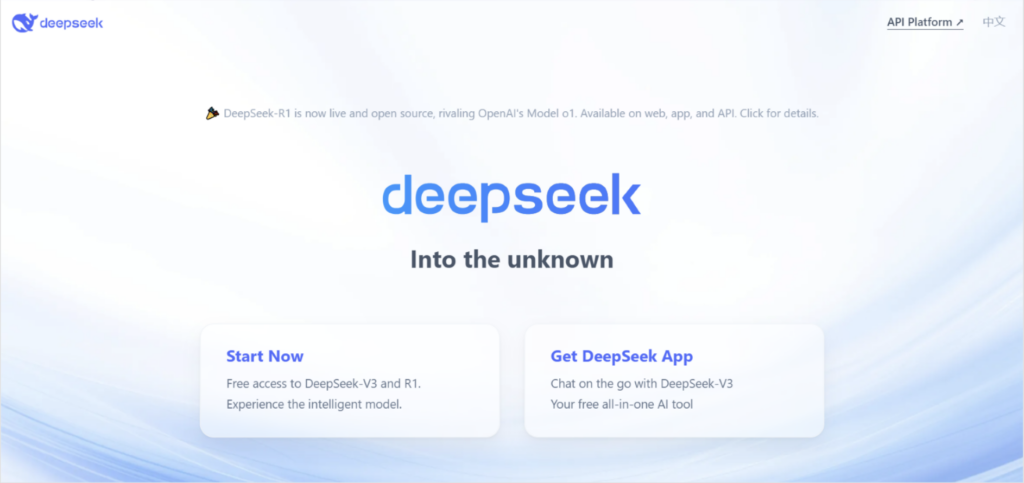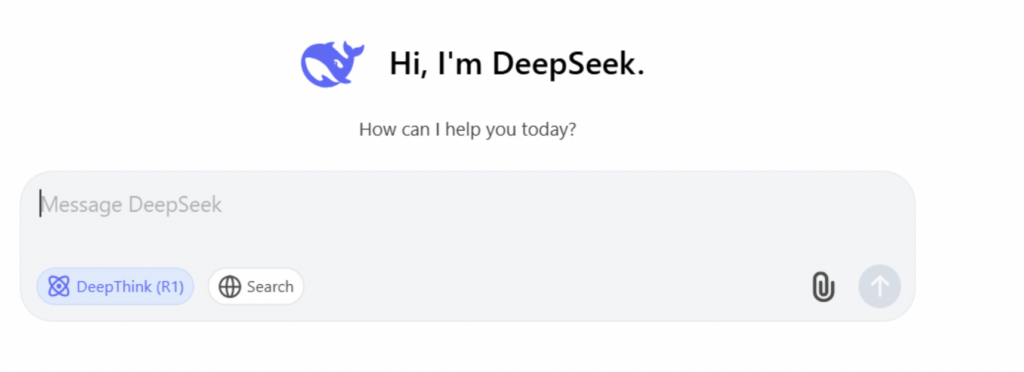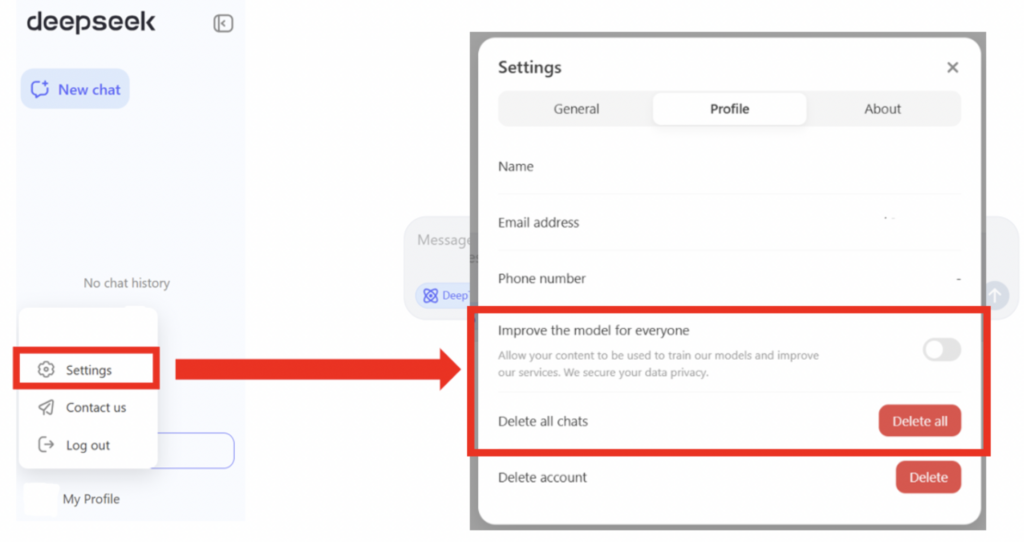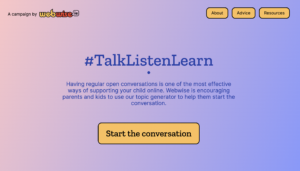Explained: What is DeepSeek?

What is DeepSeek?
DeepSeek, a Chinese AI chatbot, has gained attention as a rival to established chatbots like OpenAI’s ChatGPT. Since its release in January 2025, it has made headlines by topping app download charts and challenging well-established U.S. alternatives. The model is said to match the capabilities of OpenAI’s technology but much more cheaply and efficiently.
However, its emergence has also raised concerns about data protection and privacy, particularly regarding how user data is collected, stored, and used under Chinese regulations, adding to the ongoing debate over AI governance and security.
How does it work?
It has a similar look and feel to many chatbots in how it operates. Like others such as OpenAI’s ChatGPT or Google’s Gemini, you open the app or visit the website, pose it questions, and the AI provides a response. As with other chatbots, it can be used for learning, search, analysis, drafting stories or articles and wide range of other uses.
Like other chatbots, it uses a method called machine learning, where it processes large amounts of text data, including books, articles, websites, research papers, and other publicly available sources. By analysing this data, it learns how language works, allowing it to understand questions and generate relevant responses. The system uses algorithms to detect patterns in the text, which helps it improve its accuracy over time as it interacts with users.
How do I use DeepSeek?

To start using DeepSeek, you need to sign-up on the platform. Sign-up is done by providing an email address or a phone number. Otherwise, it is also possible to log in with a Google account.
In the bottom area of the website, it links to all the platforms and resources, as well as its Privacy Policy and the Terms of Use.
Data Concerns
The DeepSeek Privacy Policy says “We store the information we collect in secure servers located in the People’s Republic of China” this has led to concerns about data privacy, security and storage.
Turning off chat history and disable model training:
This can be done by navigating to the account name -> settings -> “Improve the model for everyone” and “delete chats”.

Is it free?
DeepSeek offers both free and paid access, depending on how you use it.
The free access includes basic usage of the platform with daily limits. Generally, free users can ask 10–30 questions per day about general topics, coding help, or writing. Responses are slower, as priority is often given to paid users.
Paid access includes advanced features, with the ability to ask unlimited questions and receive priority support.
Is there an age restriction?
At the time of registration, DeepSeek verifies the user’s age. They say that the services are not intended for children under the age of 14.
What are the benefits?
DeepSeek helps users by providing personalised AI tools that can boost productivity and creativity. It can make tasks like writing and research easier.
What are the limitations?
Despite being a useful tool, DeepSeek has its limitations.
The effectiveness of DeepSeek’s suggestions and insights relies heavily on the quality of the input provided. If the input is unclear, incomplete, or ambiguous, the AI may offer less accurate or relevant results.
DeepSeek’s tools may not always fully understand the differences in language or culture across various situations. As a result, the AI might offer suggestions that aren’t as accurate or suitable.
Like many AI tools, DeepSeek’s knowledge is based on data up to its last training update. It may not have access to the most recent or specific information if that data has not been included in its training. And therefore, it cannot provide real-time information.
What are the risks?
Misinformation and inaccuracy
As all AI tool, DeepSeek can generate plausible sounding but incorrect, outdated, or nonsensical answers. Therefore, it is important to keep in mind that DeepSeek cannot replace professionals, like doctors, lawyers or financial advisors.
Bias and Harmful content
The answers given from DeepSeek may reflect biases in training data, including stereotypes or generate harmful content. DeepSeek-R1 is trained to avoid politically sensitive questions, especially it appears to be not able to provide information about topics that are deemed to be sensitive by China’s government.
Data security
Data, including personal details, may be stored, leaked, or misused if not properly safeguarded.
Over-reliance
Users may blindly trust AI answers without critical thinking, leading to poor decisions or reduced skills.
Legal and Ethical issues
Copyright violations (e.g., reproducing copyrighted text), compliance failures, or unethical use cases.
Advice for parents

- Staying up-to-date with evolving technology can be challenging but having open and regular conversations with your child is key to supporting them in having a safe and positive online experience. Talk about the types of content they might encounter and what they should do if something upsets or bothers them.
- Take the time to explore tools like DeepSeek and assess whether it is suitable for your child’s age and understanding.
- Encourage your child or teenager to develop critical thinking skills, enabling them to approach online information with a questioning mindset. Teach them the importance of the STOP, THINK, CHECK approach—verifying information with credible sources before accepting it as true.
- Discuss the importance of privacy and the need to avoid sharing personal information with strangers or online platforms, including DeepSeek.
- Finally, talk to your child about using DeepSeek responsibly. Chatbots are powerful tools with many useful applications, it can also be misused, such as to complete assignments or essays. Emphasise using it ethically, while recognising the benefits it offers in generating ideas, researching topics of interest, developing critical thinking, and fostering creativity.
Useful links

Sometimes it can be hard to know how to start the chat with your child or teenager about what they are doing online, and the challenges and opportunities of the Internet. The Webwise #TalkListenLearn Online Topic Generator is a great way for families to have conversations about the online world in a fun, non-judgemental, way.
It’s never too early to talk to your child about being safe online. Áine Lynch, National Parents Council Primary has practical advice and tips for parents of younger children.
What are the key things we need to teach teens about being safe online? Elaine Byrnes, Doctoral Researcher-Psychology, offers advice for parents on talking to your teen about online safety.
Parental controls are available on most Internet-enabled devices including computers, smartphones, tablets and gaming systems. Parental controls can help reduce the risk of your child encountering inappropriate content when they are online. Find out how to set up parental controls on all devices.
Parents – What is False Information
It is important to be able to judge how accurate and reliable our information is. This means asking questions about where our information comes from, who produced it and why, evaluating the impact it may have, and determining to what extent it can be trusted. More advice for parents on false information, and tips for spotting misinformation.
A Parents’ Guide to a Better Internet – Free Online Safety Booklet
The Webwise online safety booklet for parents is free, and provides advice and information on a wide range of key topics including privacy, safety, and developing critical thinking skills.
Stay informed by visiting the Webwise Parents Hub
The Parents Hub has free advice videos from experts in psychology, technology, education and parenting; Explainer Guides to popular apps and platforms; Talking Points; How-To Guides; and resources.
Information is everywhere and sometimes it can be difficult to judge how accurate or reliable information is. For more information, advice and tips, visit: bemediasmart.ie
Facts Matter is an introductory guide for adult literacy and adult education practitioners who wish to build their students’ knowledge, understanding, skills and confidence in critical thinking, media and digital literacy.
AI in Education: Innovations, Opportunities and Ethical Perspectives
This webinar delves into the increasingly prevalent role of Artificial Intelligence (AI) in our daily lives and its potential in education.





